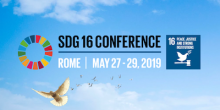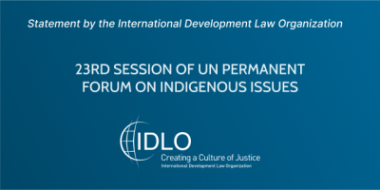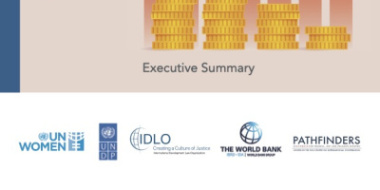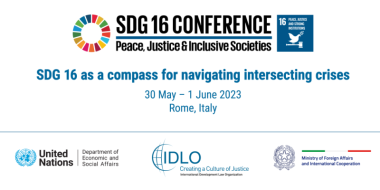Promote peaceful and inclusive societies for sustainable development, provide access to justice for all and build effective, accountable and inclusive institutions at all levels.
Rule of law drives sustainable development at local and global levels
The principles of the rule of law – equality, equity, inclusion, rights, laws and institutions – are embedded throughout the 2030 Agenda for Sustainable Development and well-articulated in Sustainable Development Goal (SDG) 16, which aims to “promote peaceful and inclusive societies for sustainable development, provide access to justice for all and build effective, accountable and inclusive institutions at all levels”.
Access to justice and the rule of law enable people to resolve conflicts, claim their rights and seek and obtain remedies. They help to level the playing field between the vulnerable and the powerful by addressing issues of impunity, corruption and discrimination.
That makes SDG 16 a critical driver for the achievement of all other SDGs. Neither food security nor gender equality, neither poverty eradication nor economic development can be advanced without respect for the rule of law.
Having been an ardent advocate for the inclusion of SDG 16 in the 2030 Agenda, IDLO is fully committed to advancing the SDGs. Whether in fragile contexts, emerging democracies or middle-income countries, IDLO contributed to the 2030 Agenda in 2017 through its programs, research and policy advocacy, positioning the rule of law as a key ingredient for sustaining peace and sustainable development.
Building institutions for peace and justice, strengthening accountability, empowering women and girls, fighting corruption, protecting biodiversity and promoting inclusive economic growth are some of the ways in which IDLO’s programs and other activities furthered the implementation of the SDGs in 2017.
Engaging in policy dialogue with governments, donors and policy thinkers at global and national levels in 2017, IDLO highlighted the significance of the rule of law for the achievement of Agenda 2030. Its advocacy was backed by robust research drawing on the lessons learned from its programmatic experience.














